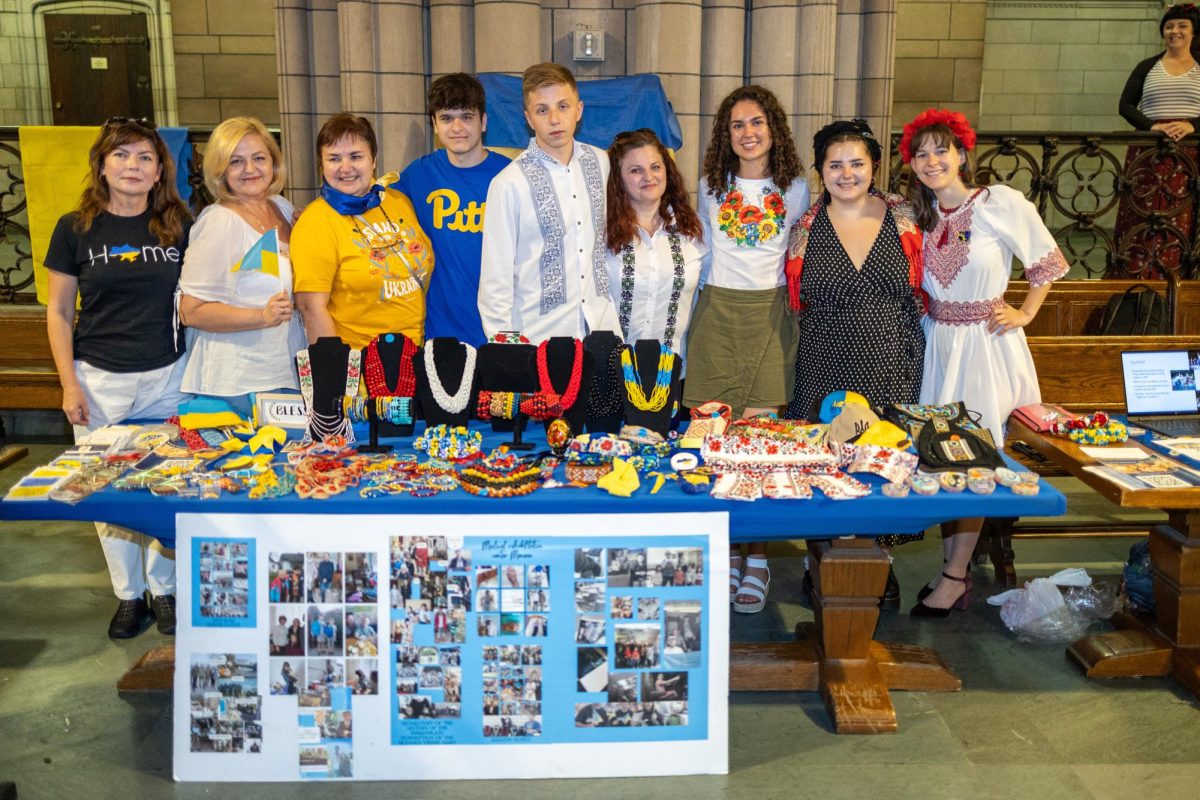From enjoying Dobos cake and Turkish coffee to watching Bulgarian dances and Austrian puppetry, visitors who attended Pitt’s East European Festival this weekend got a chance to celebrate Eastern European cultures that have a rich history in Pittsburgh.
The East European Festival took place in the Commons Room of the Cathedral Learning last Sunday. The event celebrated the diverse cultures and languages of Eastern Europe through traditional food, music, dance, poetry and art.
As part of the festival’s program, students in Pitt’s Austrian Puppetry course, taught by assistant professor Orin James, performed a puppet show called “The Magic Flower.” Following the puppetry, students of the Department of Slavic Languages and Literatures and the Less-Commonly-Taught Languages Center recited poems in Greek, Hungarian, Russian, Slovak and more Eastern European languages as part of the Poetry in Eastern Europe program. The festival finished with a Bulgarian dance performance from students from the Bulgarian Macedonian National Educational and Cultural Center.
Tables with student organizations, clubs, food vendors and local Eastern European diaspora organizations also circled the Commons Room, providing attendees with a range of cultural learning opportunities. Nationality rooms representing different countries in Eastern Europe were open during the festival, with their committees present to help guide visitors through the rooms and share information about their history.
Matt Miloszar, the vice president of Pitt’s Graduate Organization for the Study of Europe and Central Asia, said he enjoyed the mix of entertainment and education at the festival.
“It’s academic in the sense that Pitt offers language and culture classes in all these countries and an opportunity to study them more in depth, while also bringing the whole Pittsburgh community together to celebrate these cultures,” Miloszar said.
Pittsburgh has a rich history of Eastern European emigration to the city. Abagail Kraus, junior biology and chemistry major with a Slovak studies minor and the president of Pitt’s Slovak Club, said the festival provided a great opportunity to help Pitt students connect with their Czechoslovak heritage.
“It’s a huge population within Pittsburgh of people who are either Czech and Slovak or have Slovak or Czech heritage, so we want to make sure we give a space for students to explore that more,” Kraus said. “At this festival we have a chance to reach out to other students more than we usually would.”
Kraus said many Pitt students and Pittsburghers have lost touch with their Eastern European cultures due to social forces of assimilation and Americanization. In light of this, Kraus said she found aiding students’ interest in their heritage at the festival to be a rewarding experience.
“They [students] know they’re Slovak, but they don’t know how to explore that, so we provide the opportunity for people to help get a deep dive,” Kraus said. “It feels amazing because you see people get so excited over something. They feel like they’re gaining a part of themselves again.”
Zita Tóth-Shawgo, the engagement coordinator for Pitt’s Center for Russian, East European and Eurasian Studies and the University Center for International Studies (UCIS) also said spurring students’ excitement for their culture and heritage is an important part of the festival, along with cross-cultural understanding.
“On a more holistic level, I hope that the festival will spark their [Pitt students’] curiosity,” Tóth-Shawgo said. “Learning about different cultures, being cognizant of the differences and similarities in our cultures all ties into a greater understanding of each other, which at the end of the day benefits us all as a community, be it local or global.”
Nerina Sivonjic, the treasurer of the Yugoslav Nationality Room, taught people about her culture while serving a type of coffee made across the Balkans. Although Sivonjic said some people recognize the coffee by different names — Turkish or Bosnian — the joy of getting to share a part of her Bosnian heritage with visitors mattered most to her.
“It’s really exciting to see people be curious and ask questions — it makes me feel really proud,” Sivonjic said. “It makes me feel seen, and I think it allows people just how many different cultures we have in Pittsburgh and make visible some communities that are not as known, but are still a big part of a landscape.”
For Diana Lysova, a sophomore Asian studies major and the president of Russian Culture and Language Club, cultural visibility and representation is invaluable.
Through her club, Lysova aims to give the full picture of Russian culture to Pitt students and expand conversations about Russia beyond just its government.
“I think that it’s always very important for people to feel like their culture is important and honorable and valuable, especially while living abroad,” Lysova said. “To have a space where you are the person in the middle, like people come to look at you and hear what you have to say — that makes you feel important.”
Lysova and the club’s event coordinator, Alisa Stolyar, wore the traditional Russian women’s headdress called the Kokoshnik and the traditional Sarafan dress at the club’s table.
Lysova said seeing people interact with the culture of Eastern Europe made her feel proud of her cultural identity.
“It makes you feel like your culture isn’t just a minor part of you. It is something like a pillar that makes up who you ultimately are,” Lysova said.



